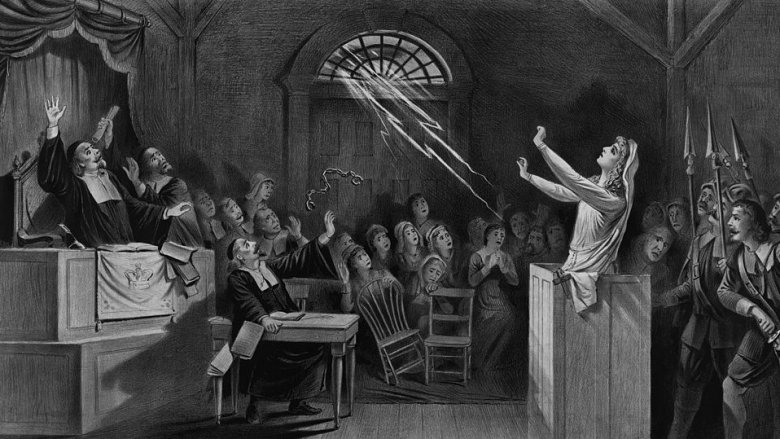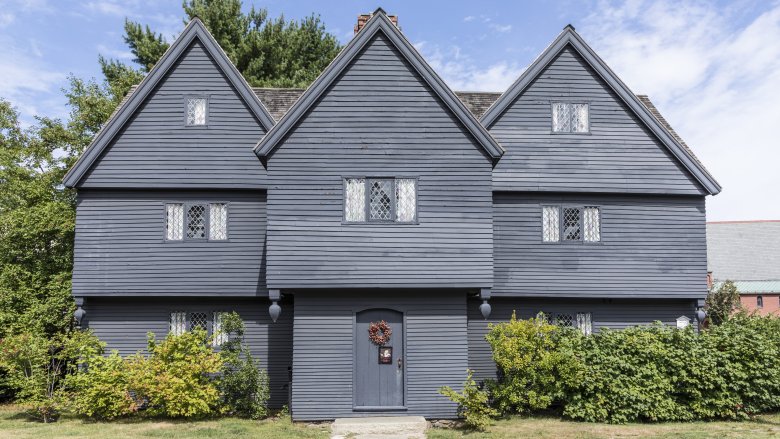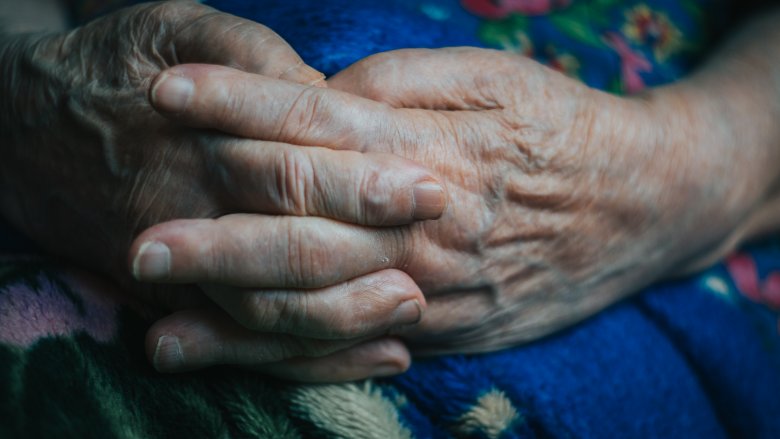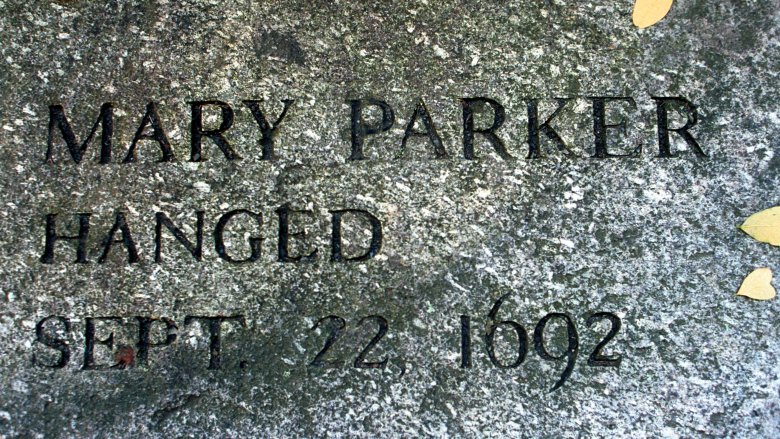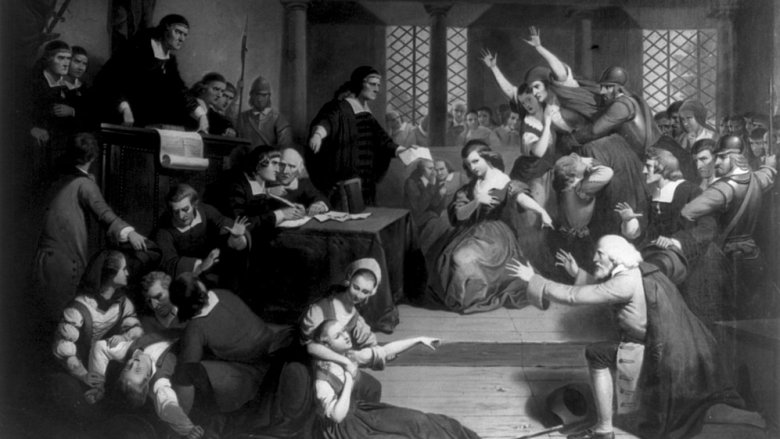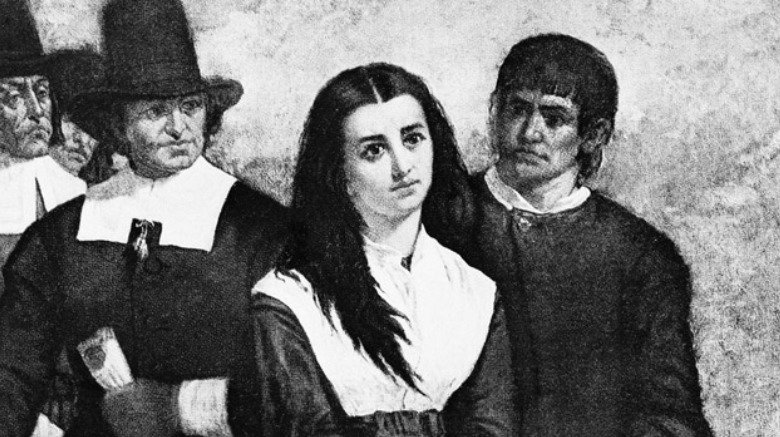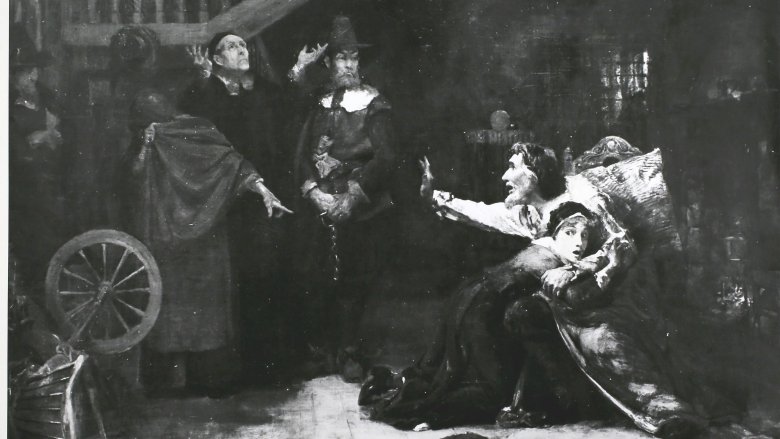What Life Was Really Like For Women During The Salem Witch Trials
No matter how you look at it, it sucked to be accused of witchcraft in late 1600s Salem, Massachusetts. Or any time, really, but we're just going to stick with Salem, Massachusetts in the late 1600s because it's the epitome of suckiness as far as the whole getting-accused-of-witchcraft thing is concerned.
So obviously, being a woman in Salem, Massachusetts during the infamous witch trials was extra perilous (and it was even perilous for men — four of the 19 people who were convicted and hanged were male), but the world you had to live in was already extra perilous, so it was sort of a double whammy of suckiness. There were the bitterly cold winters, the failing crops, and the political strife ... so you could freeze your butt off all night, struggle to put food on the table in the morning, deal with a scheming enemy in the afternoon, and get accused of witchcraft in the evening. Yes, it wasn't much fun to be a citizen of Salem, Massachusetts circa 1692, but it was especially sucky if you were a female citizen of Salem, Massachusetts. Let's find out why.
What the heck happened in Salem?
Before we get started, there are a lot of misconceptions about what happened during the Salem witch trials. First of all, no one was burned. According to the Washington Post, burning was a French thing, and the colonists at Salem were still purely British. Most of the people who died during the Salem witch trials were hanged.
That's what we do know. What we don't know is what was really behind the hysteria. It began when two girls, ages 9 and 11, started behaving strangely. They screamed and threw things and contorted like they were possessed, so naturally, the local doctor decided they were possessed. Pretty soon, more girls joined in, and the adults started pressuring them to name names. When the girls pointed to the first three "witches," one of them made a full confession and implicated others. That's when the real hysteria began. The townspeople, desperate to root out the devil, encouraged the afflicted to name even more names, and soon no one was safe. At the end of the ordeal, nearly 200 people had been accused, 20 people had been executed, and a few had died while in prison.
So was it an illness that made those first two girls behave the way they did? Or was it acting? We probably won't ever know for sure, but we do know this: It was a dangerous time to be a human in Salem, and an even more dangerous time to be female.
The weather in Salem sucked
The suckiest thing about living in a time before air conditioning and central heating is you, you know, lived in a time before air conditioning and central heating. In the winter, you were always cold and in the summer, you were always hot. Sure, this was just as much a problem for men as it was for women, but the whole dress code thing made life just that little bit more uncomfortable. According to The History of American Women, Puritan women had to cover their heads and their arms in public, so it's not like you could just put on a pair of shorts and a tank top to help get you through those hot and sweaty summer days.
The real problem wasn't that you were uncomfortable for most of the year, it was the weather directly impacted your ability to feed your family. The 1680s and 1690s happened during the "Maunder Minimum," a period of time towards the middle of the Little Ice Age, when several of the world's mountain glaciers expanded, causing global temperature change. During those years, the weather was unusually cold in the winter and especially dry in the summer, and once-prosperous towns in Massachusetts were suddenly unable to produce enough food for everyone. So in Salem you were not only miserable all the time, you were also hungry. And when those two conditions are the norm, people grow restless and start accusing each other of witchcraft. Winter is coming, people.
The political atmosphere in Salem also sucked
When you're a colonist, you depend on your mother country to help you out in times of need. Imagine if you were one of the first colonists on Mars, and then you found out that America got into some major conflict with Canada and suddenly you're not sure whether the next supply ship is going to arrive on time. What happens in the home country can have a pretty big impact on your often-difficult life in the colonies. And it was even worse before the internet, because you couldn't just Google, "U.S.-Canadian War" and know exactly what's going on over there.
So being a colonist already means you've got a certain amount of insecurity, but then there's the rumor mill. You heard from Goody Johnson who heard from Goody Wilson who heard from Goody Smith that one of Britain's nearby colonies lost its charter, and now it seems possible your town might also lose its charter and be subjected to royal rule and (gasp!) religious tolerance.
According to Smithsonian, Salem's problems were compounded by the fact that it also had an excess of refugees from King William's War, the British crown's war with France in North America. In those days there was no name for post-traumatic stress disorder, but it may have played a role in the Salem witch trials — some scholars think the "affliction" of the girls who were making the accusations might have had its roots in some kind of trauma.
If you didn't follow the rules in Salem, you were in trouble with God
For people in general, women included, life in Salem, Massachusetts was not especially easy. But it wasn't just the politics and the weather that made life hard — life was also hard because of the rules that had been imposed on the people by their own religion. The citizens of Salem were Puritans, so not only did they have a lot of rules they had to follow, they also had a lot of really ugly consequences for failing to follow the rules. Naughty Puritans didn't just answer to the local government, they had to answer to God himself. According to Michigan State University, the laws weren't just regarding basic, common sense things like stealing or running a red light, either — Puritan law dictated your morals as well as your behavior.
The church had so much power over the citizenry that few dared to criticize it, and those that did were pretty much inviting accusations of ungodly behavior and, by extension, witchcraft. Once the madness of the Salem witch trials was fully underway, it was a really, really bad idea to stand up and say, "Hey, maybe the church is actually wrong about all this witchcraft stuff?" It's sad that so many people kept their mouths shut while their friends and neighbors were accused, put on trial, and tortured, but it's really not super-surprising that they did.
Salem women were expected to uphold ideals of purity and modesty
The Puritans expected women to be feminine, modest, and to look at their shoes all the time. They were supposed to provide a moral example to their families, and if they ever failed to meet those expectations, well, they became a black mark upon the Puritans' godly society. According to Women in Early America: Struggle, Survival, and Freedom in a New World, women who were accused of fornication could be whipped, publicly shamed in the stocks, forced to read humiliating statements in front of the congregation, and charged lofty fines. And even after all of that, the stain on their reputations never really went away. To be fair, the men also suffered humiliation for engaging in premarital fornication, though it wasn't quite at the same level. People expected men to stray, but women were supposed to know better. Nice double standard you've got there, Puritans.
Female fornicators became pariahs — they were considered "filthy, dissolute, and untrustworthy." And women who became pregnant out of wedlock couldn't fix things with a hasty marriage, either — a couple who had a baby within eight months of their wedding were punished with temporary excommunication. A single mother would be publicly whipped after the birth of her child, and then the town had the right to take her child away and put him or her into indentured servitude. So even before anyone called you a witch, you weren't really having a whole lot of fun.
Salem's social outcasts and non-conformists were the first to go
You'd think that people would mostly respect their elders in a society that valued purity and modesty, and for the most part they did — as long as their elders were well-behaved. Oh and also, the bar was pretty low in Puritan America as far as when you got to start calling someone a "crone" to her face — if you were in your 50s, you were elderly.
Women in Puritan New England were thought of as weak, and therefore more susceptible to being seduced by the devil. So if you were a non-conformist or a social outcast it was already pretty clear how easy it would be for the devil to tempt you. According to Refinery29, the first women to be tried for witchcraft in Salem were those who did not fit nicely into the mold of Puritan society. One was elderly (in her 50s) and might have (gasp) had premarital sex with her second husband. Another was a homeless widow who had to beg for money and food. The other was a slave who may have come from somewhere exotic, like Barbados or South America, so she was already under suspicion of knowing things about witchcraft that no good, white Puritan ought to know.
Before the citizens of Salem started to accuse everyone and their dog (and there actually were two dogs accused of witchcraft), these people might have been tolerated, but in the hysteria, they became obvious targets.
If your husband was involved in Salem politics, you were a witch
Much like America today, the political world of Salem, Massachusetts was a deeply divided place. Nowadays, when we disagree with each other about politics we just put bumper stickers on our cars and trash talk each other on Twitter, but in Salem, Massachusetts in the 1690s, people had to trash talk each other face-to-face. And in those days, you could use Puritan law to put your enemy in his place. During the Salem witch trials, it became easier than ever.
The problem for a woman in Salem was that she had to pretty much go along with her husband's dumb political beliefs, even if they didn't align with her own feelings and even if they were clearly going to make someone cry out, "Your wife is a witch!" So she might see the danger coming, but she was helpless to do anything about it.
According to the History of Massachusetts, the most powerful families in Salem were embroiled in land disputes and just generally did not like each other. Once the trials got rolling, it started to become clear a person could be accused not just for her own political beliefs but for her husband's political beliefs — Rebecca Nurse was famously accused not long after her husband joined a committee that spoke out against the current town minister.
If a man stood up for you during the Salem witch trials, he might go down with you
In modern America, we have the freedom to speak out against injustice. We might sign a petition, or participate in a march, or attend a town hall, or complain that it's just not easy enough to vote — that is, if there isn't something really good on television that night. But during the Salem witch trials, well, it was generally a bad idea to speak up against injustice because the person on the other end of the injustice might end up being you.
According to History, John Proctor's pregnant wife Elizabeth was one of many people accused of witchcraft, but it became clear as her testimony progressed that the person who was really on trial was Proctor himself. He was one of the few townspeople who dared say out loud that the accusers were lying, and that he thought the trials were an injustice. Meanwhile, most of the rest of the men were all, "She's a witch! Hang her!" so his opinion was not especially appreciated among his peers. Proctor was eventually accused himself and was one of the few men in Salem to be hanged for witchcraft.
The clear danger of speaking out was probably one of the reasons why the trials went on as long as they did — when no one will say anything in the face of injustice, it makes it really easy for the injustice to continue.
Once you were accused in the Salem witch trials, no one would really believe otherwise
In Salem, Massachusetts, women were second-class citizens. As a woman, you weren't permitted to vote in the General Court, you couldn't buy or sell land, you couldn't sue someone, you couldn't file for divorce, and you had to do everything your husband told you to. So once you were up there on the stand, well, you already didn't have a lot of respect from all of the men who'd imposed those stupid restrictions on your freedom, so there wasn't a whole lot of hope for unconvincing them of the thing they were already convinced of.
According to Refinery29, the trials resembled a modern-day congressional inquiry in that the people being questioned were mostly just being yelled at — the magistrates would fling angry and accusatory questions at them, probably more for the sake of trumping up a fervor among the spectators rather than for actually giving the accused a chance to defend themselves.
During the Salem witch trials, nearly 200 people were accused of practicing witchcraft. So why weren't more of them executed? Because confession meant you would avoid paying the ultimate price, and so there were a hell of a lot of confessions. The slave who confessed early on was eventually released. Others confessed, too — some to ridiculous crimes like fornicating with the devil and riding on broomsticks. Which says nothing about how guilty they were, and everything about how scared they were.
The only way to not be accused in the Salem witch trials was be an accuser
The Puritans were big on the Apostle Paul's decree against women having spiritual authority. (Paul said, "Let your women keep silent in the churches, for they are not permitted to speak; but they are to be submissive, as also the law says.") That directive carried over to much of the rest of Puritan life, where a woman didn't have much of a voice outside of her own family, and even in her own family, her opinions could be overruled by her husband.
So were the accusers giving themselves voices, in a way? In a place where silence is valued and girls don't get much attention, perhaps the accusations, the "fits," and the extended nature of the whole affair was simply a way for them to use their otherwise silenced voices. According to The Journal of the American Academy of Psychiatry and the Law, the girls basically found themselves on a pedestal in front of the whole town. As the months stretched on, the marginalized people who'd initially been accused were joined by respected citizens, children, former ministers, among others. Interestingly, the "bewitched" and "possessed" were the only people in town who were in no danger of becoming accused themselves. So while some of the girls might have been enjoying their time in the spotlight, others might have been sage enough to know joining the ranks of the afflicted was the only guarantee of safety.
"Evidence" in the Salem witch trials could totally be made up
These days, if you're convicted of a crime it's usually because of the irrefutable evidence. Usually. Most of us aren't naive enough to think that's always the way it goes, but just bear with us. In a modern courtroom, it may be enough to say, "I saw this person do this thing," but such a he-said she-said case is going to be a lot stronger if it's supported by real physical evidence.
Puritan New England was not such a black and white place. There were things that could be proven or disproved based on evidence, but spiritual, and therefore intangible things that you felt or experienced separately from the physical world were also very real to the Puritans. According to Smithsonian, in Salem a person could be convicted based on so-called "spectral evidence," which means an accuser could claim that they saw the accused smoking a pipe with the devil or binge-watching Breaking Bad on the living room sofa of hell in a dream or vision, and that ridiculous claim could be entered into evidence and used to secure a conviction.
Not everyone thought that spectral evidence was fair, though. A minister named Cotton Mather wrote a letter to the court asking for spectral evidence to be disallowed, but the courts were all, "No, we like spectral evidence," and they went on convicting people, mostly women, based on dreams and visions. Sucked to be female in Salem, Massachusetts.

